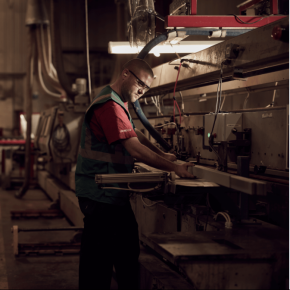
GUEST ARTICLE: How blurring the lines between business and education can cure UK’s manufacturing skills shortage
 There was a resurgence of optimism in the UK’s manufacturing sector back in March as a 20-month streak of stagnation was broken with a return to growth. Construction painted a similar picture, hinting at a more promising trajectory for these two vital, twin industries. Gavin Day, Organisational Development Manager of Masonite UK, writes the following guest article…
There was a resurgence of optimism in the UK’s manufacturing sector back in March as a 20-month streak of stagnation was broken with a return to growth. Construction painted a similar picture, hinting at a more promising trajectory for these two vital, twin industries. Gavin Day, Organisational Development Manager of Masonite UK, writes the following guest article…
“Hope was short lived as last month’s manufacturing figures dipped once again, with UK PMI down from 50.3 to 49.1. Even as the wider economy is seeing green shoots, the sector’s underlying recruitment challenges still loom large.
The inconsistency in month-to-month economic output serves as a stark reminder of the need to lay strong foundations to reinvigorate the industry for the long-term. Taking action to build a workforce for the future is the natural first step.
Standing at a critical juncture, the manufacturing sector must play its part in supporting the UK’s recent shift towards vocational education to heal its depleting workforce and drive economic growth.
A workforce conundrum
A report by the Construction Products Association forecasts that construction will lose a quarter of its workforce (around 500,000 workers) in the next 10-15 years due to the fact that most employees are in the 50-64 age bracket. The legacy of Brexit has also had an impact, with an estimated 46,000 construction workers leaving the sector. Manufacturing is experiencing much the same fate.
Attracting a younger generation of workers is therefore vital but a wider problem of economic inactivity is complicating matters further. Immediately post-COVID, it was the return of the over 50s to work that was supposed to kickstart the UK’s economic revival. The age range has now flipped with economic inactivity in 16 to 24yr olds rising the fastest amongst any age group in Britain.
There are 248,000 more young people inactive this year than last year, a concerning trend that stems in part from a lack of careers support from a young age. So how can we turn the tide and attract a younger generation of workers to propel the industry back into growth?
Blurring the business/education line
The government has laid good groundworks with the introduction of the Advanced British Standard qualification that will help provide a balance between technical and academic education for those over 16. But the state can only go so far. It’s now imperative for the private sector to step in and step up, offering real world experience to equip the next generation of workers.
According to Turner & Townsend (T&T), the enrolment of 16–24-year-olds in construction training has plummeted to a mere quarter of its 2007 level, with many still viewing the sector as ‘low tech, manual labour, with limited opportunities for progression.’
The firms that risk missing out on potential employees should be working with local schools and colleges to engage students at a young age, providing robust career advice and debunking misconceptions. Something as simple as supporting a secondary school pupil to write their first CV can help forge the pathway to future employment in the sector.
Driving a mindset change can then lead to a greater focus on providing opportunities to develop skills and knowledge within manufacturing and construction to address the skills shortage. We are working alongside Barnsley College and Nottingham College as part of the Masonite Academy to do exactly that. Other industry leaders are showing the way, such as JCB and its partnership with Coleg Cambria in Wales, but more must be done to help facilitate this evolution to a more vocational educational framework.
Positive knock-on effects
The impact of firms taking action will extend beyond bolstering their own workforce or indeed the sector they operate in. The local business community as a whole will also prosper as young people develop a broad set of skills that will extend beyond manufacturing.
Furthermore, with the UK’s manufacturing hubs often located in traditionally working-class communities, major employers have an opportunity to work with education providers both to reset peoples’ perception of the sector and engage a future workforce on the opportunities available within their local communities.
By emulating the Barnsley, Nottingham or North-East Wales models nationwide, businesses have an opportunity to address not only the pressing issue of labour shortages but also, more broadly, combat the escalating trend of economic inactivity amongst our young people.
As the manufacturing sector teeters on the brink of uncertainty, a strategic realignment is needed to kickstart growth once again. Private and public sector investment in vocational education is imperative to safeguard the future of an industry integral to the UK’s economic fabric both in the past and, we hope, well into the future.”
Latest news

28th February 2025
Passivent ventilation solutions are top of the class
Passivent has supplied a combination of Hybrid Plus2 Aircool ventilators and Hybrid Plus Airstract roof ventilation terminals for a new London primary school.
Posted in Air Conditioning, Articles, Building Industry News, Building Products & Structures, Building Services, Case Studies, Ceilings, Facility Management & Building Services, Heating, Ventilation and Air Conditioning - HVAC, Restoration & Refurbishment, Retrofit & Renovation, Roofs, Sustainability & Energy Efficiency, Ventilation, Walls
28th February 2025
Troldtekt: New acoustic liner ensures good acoustics and easy handling
Both a building’s users and its developers have a good reason to get excited about the new Troldtekt Plus 25 panels. This specially developed acoustic panel sets a high standard for both sound absorption and building efficiency.
Posted in Acoustics, Noise & Vibration Control, Articles, Building Industry News, Building Products & Structures, Building Services, Building Systems, Ceilings, Facility Management & Building Services, Floors, Innovations & New Products, Insulation, Interior Design & Construction, Interiors, Restoration & Refurbishment, Retrofit & Renovation, Timber Buildings and Timber Products, Walls
28th February 2025
InstallerSHOW 2025 – Registration is now OPEN!
Building on the success of last year, InstallerSHOW is returning to the NEC from the 24th to the 26th of June…
Posted in Articles, Building Industry Events, Building Industry News, Building Products & Structures, Building Services, Exhibitions and Conferences, Health & Safety, Retrofit & Renovation, Seminars, Sustainability & Energy Efficiency
28th February 2025
ABLOY securing Helsinki’s heritage and Croatia’s waste management
ABLOY, part of ASSA ABLOY Group, has redefined its brand, focusing on the value it brings to customers around the world…
Posted in Access Control & Door Entry Systems, Architectural Ironmongery, Articles, Building Industry News, Building Products & Structures, Building Services, Case Studies, Doors, Facility Management & Building Services, Health & Safety, Retrofit & Renovation, Security and Fire Protection
 Sign up:
Sign up: